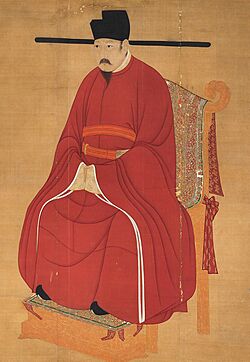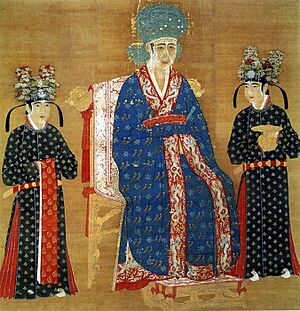Emperor Renzong of Song facts for kids
Quick facts for kids Emperor Renzong of Song宋仁宗 |
|||||||||||||
|---|---|---|---|---|---|---|---|---|---|---|---|---|---|

|
|||||||||||||
| Emperor of the Song dynasty | |||||||||||||
| Reign | 24 March 1022 – 30 April 1063 | ||||||||||||
| Enthronement | 24 March 1022 | ||||||||||||
| Predecessor | Zhenzong | ||||||||||||
| Successor | Yingzong | ||||||||||||
| Regent | Empress Dowager Liu (1022–1033) | ||||||||||||
| Born | Zhao Shouyi (趙受益) 30 May 1010 (大中祥符三年四月十四日) Northern Song |
||||||||||||
| Died | 30 April 1063 (aged 52) (嘉祐八年三月廿九日) Bianliang, Northern Song |
||||||||||||
| Burial | Yongzhao Mausoleum (永昭陵), Gongyi, Henan Province, China | ||||||||||||
| Spouse(s) |
Empress Guo
(m. 1024; dep. 1033)Empress Wencheng
(died 1054) |
||||||||||||
| Issue among others... |
|
||||||||||||
|
|||||||||||||
| House | Zhao | ||||||||||||
| Dynasty | Song | ||||||||||||
| Father | Emperor Zhenzong | ||||||||||||
| Mother | Empress Zhangyi | ||||||||||||
| Signature |  |
||||||||||||
| Emperor Renzong of Song | |||||||||||
|---|---|---|---|---|---|---|---|---|---|---|---|
| Chinese | 宋仁宗 | ||||||||||
| Literal meaning | "Benevolent Ancestor of the Song" | ||||||||||
|
|||||||||||
| Zhao Zhen | |||||||||||
| Traditional Chinese | 趙禎 | ||||||||||
| Simplified Chinese | 赵祯 | ||||||||||
|
|||||||||||
| Zhao Shouyi | |||||||||||
| Traditional Chinese | 趙受益 | ||||||||||
| Simplified Chinese | 赵受益 | ||||||||||
|
|||||||||||
Emperor Renzong of Song (born Zhao Zhen) was the fourth emperor of China's Northern Song dynasty. He ruled for about 41 years, from 1022 until his death in 1063. This makes him the longest-reigning emperor of the Song dynasty. He was the sixth son of the previous emperor, Emperor Zhenzong. Since his own sons passed away young, his cousin's son, Zhao Shu, became the next emperor.
Contents
Becoming Emperor
Emperor Renzong's father, Emperor Zhenzong, died in 1022. This meant that 12-year-old Renzong became the new emperor. His adoptive mother, Empress Liu, ruled for him as a regent. A regent is someone who governs a country because the true ruler is too young or unable to rule. By 1027, Renzong was old enough to rule by himself. However, Empress Liu refused to give up power. She continued to rule until she died in 1033.
Renzong's Reign
Emperor Renzong's time as ruler was very important for the Song Dynasty. It was a time when the dynasty was at its strongest. However, it also marked the start of a slow decline that would last for over 150 years.
Foreign Relations
The Song Empire's official policy was to avoid war, which meant its military became weaker. The Tangut-led Western Xia state noticed this. They started small wars near the borders of the Song Empire.
In 1038, the Tangut leader Li Yuanhao declared himself emperor of Da Xia. He demanded that Emperor Renzong recognize him as an equal ruler. The Song court only agreed to recognize Li Yuanhao as a governor, not as an "emperor." They believed only the Song emperor could use that title. After many talks, the Tangut state agreed in 1043 to accept the Song emperor as the only emperor. In return, the Song Empire sent them annual gifts. This showed that the Song Empire quietly accepted the Tanguts' military strength.
Emperor Renzong tried to make the military stronger. He also paid large amounts of money to the Khitan-led Liao dynasty. The Liao dynasty was an enemy of Western Xia. Renzong hoped this would keep the Song Empire safe. But these policies were very expensive. Taxes went up a lot, and many farmers became very poor. This led to organized rebellions across the country. It also caused problems for the Song government.
Government and Economic Changes
Renzong is known for his attempt to make big changes called the Qingli Reforms. These reforms happened around 1040–1045. They aimed to make the government stronger and more efficient. Important leaders like Fan Zhongyan and Ouyang Xiu supported these changes.
The reforms wanted to:
- Increase farm production.
- Get back unused land.
- Reduce the number of small government offices.
- Improve national defense by organizing local militias.
- Lower military spending.
These ideas were good and meant to fix problems. But some conservative groups in the government did not like them. The reforms were stopped after Fan Zhongyan left his position. Even though they didn't last long, the Qingli Reforms were an important step. They paved the way for bigger reforms later in the Song Dynasty.
Cultural Achievements
During Emperor Renzong's rule, the Song Dynasty saw a great time for culture and literature. Many famous writers and scholars lived during this period. People like Fan Zhongyan, Ouyang Xiu, and Mei Yaochen started or grew their writing careers under Renzong.
A major event in 1057 was the Imperial Examination. This was a test for people to join the government. Several candidates who would become very famous passed this exam. Among them were Zeng Gong, Su Shi, and Su Zhe, along with their father Su Xun. These scholars are now known as some of the most important writers in Chinese history.
Emperor Renzong also gave a higher title to the 46th-generation descendants of Confucius. They were given the title of Duke Yansheng.
Science and Technology
During Emperor Renzong's reign (1022–1063), China made big leaps in science and technology. There was great progress in many areas:
- Astronomy: Studies led to better calendar systems and advanced observatories.
- Printing: Around 1040, Bi Sheng invented movable type printing. This was a huge step for spreading knowledge.
- Agriculture: New tools and methods, like the iron plow and the dragon backbone pump, helped farmers grow more food.
- Engineering: Clever building methods were used for large projects like bridges and dams.
- Military Technology: The Song Dynasty was the first to record using gunpowder in warfare.
In 1054, Chinese astronomers during Renzong's rule recorded a supernova explosion. This was a star exploding in space.
Death and Succession
In 1055, Emperor Renzong became very sick. He worried because he had no sons who lived to become adults. His ministers advised him to bring two younger male relatives into his palace. One of them was his nephew, Zhao Zongshi. Zhao Zongshi was later chosen to be the Crown Prince. He would become Emperor Yingzong.
Renzong died in 1063, and Emperor Yingzong became the new ruler. The entire country was sad about Renzong's death. Even across the northern border, the emperor of the Liao dynasty and his people cried. This showed how much peace the two countries had enjoyed for 42 years under Renzong's rule.
Renzong's Legacy
The book History of Song, written by historians of the Yuan Dynasty, describes Renzong as a kind, understanding, humble, and careful emperor. He was known for putting the needs of his empire before his own feelings.
One story tells that Renzong was working late one night and wanted mutton. But he stopped a servant from ordering it. He worried that ordering it once might make the cooks prepare it regularly, leading to waste. He chose to stay hungry rather than risk wasting food. This showed his commitment to being careful with resources.
Another story says Renzong ordered his officers to be very careful when using the death penalty. If an officer wrongly sentenced an innocent person to death, they would never be promoted. Renzong once told his ministers, "I have never used the word 'death' to scold others. How dare I misuse the death penalty?"
The famous scholar Su Shi praised the peace and good government during Renzong's time. He said, "For more than seventy years the Song dynasty has flourished without people knowing the perils of war, but enjoying the blessings of affluence and education." Another scholar, Fan Zuyu, also praised Emperor Renzong. He said Renzong's good rule came from five traditional virtues:
- He feared Heaven.
- He loved his people.
- He honored his ancestors.
- He loved learning.
- He listened to advice.
Fan Zuyu said practicing these five virtues is what it means to be a "benevolent" (kind and good) emperor.
Family
Emperor Renzong had several wives and many children, though many of his sons died young.
- Empress Guo (1012–1035)
- Empress Cisheng (1016–1079)
- Empress Wencheng (1024–1054)
- Princess Zhuangshun (1040–1042)
- Princess Zhuangqi (1042–1043)
- Princess Zhuangshen (1044–1045)
- Noble Consort Zhaojie (1017–1086)
- Princess Zhuangxiao (1038–1071)
- Zhao Xin, Prince Yong (1039–1041)
- Noble Consort Zhaoshu (1022–1114)
- Princess Lingde (1058–1142)
- Princess Yimu (died 1112)
- Noble Consort Zhaoyi
- Pure Consort (died 1062)
- Princess Zhuangqi (1059–1067)
- Princess Xianyi (1059–1083)
- Princess Zhuangyan (born 1061)
- Virtuous Consort (died 1064)
- Zhao Fang, Prince Yang (born 1037)
- Princess Zhuanghe (died 1042)
- Virtuous Consort (1019–1073)
- Princess Zhuangxuan (born 1042)
- Able Consort
- Princess Zhuangxi (1042–1043)
- Princess Zhuangyi (died 1044)
- Talented Lady
- Zhao Xi, Prince Jing (1041–1043)
Images for kids
See also
 In Spanish: Song Renzong para niños
In Spanish: Song Renzong para niños
- Chinese emperors family tree (middle)
- List of emperors of the Song dynasty
- Architecture of the Song dynasty
- Culture of the Song dynasty
- Economy of the Song dynasty
- History of the Song dynasty
- Society of the Song dynasty
- Technology of the Song dynasty
 | Sharif Bey |
 | Hale Woodruff |
 | Richmond Barthé |
 | Purvis Young |



